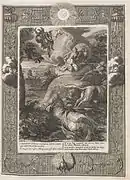Iphis
In Greek and Roman mythology, Iphis or Iphys (/ˈaɪfɪs/ EYE-fis, /ˈɪfɪs/ IF-iss; Ancient Greek: Ἶφις Îphis [íi.pʰis], gen. Ἴφιδος Ī́phidos) was a child of Telethusa and Ligdus in Crete, born female and raised male, who was later transformed by the goddess Isis into a man.

Mythology

According to the Roman poet Ovid's Metamorphoses, there was a humbly born, but well-respected, man named Ligdus who lived in Phaestus with his pregnant wife, Telethusa.[1] Ligdus said he wished for two things: that his wife delivers the baby with as little pain as possible, and that the child would be a boy. As the couple was poor, they could not afford a dowry if their unborn child was born a girl. Ligdus was forced to come to the conclusion that they must kill the child if it was female.[2] The couple cried, but Ligdus' mind was made up.[3] Telethusa despaired, but was visited in the middle of the night by the Egyptian goddess Isis, along with a train of other gods: Anubis, Bastet, Apis, Harpocrates, Osiris, and the Egyptian serpent. Isis advised her to disobey her husband's orders and to keep the child, regardless of if it was a girl and guaranteed any needed future assistance.[4] When Telethusa gave birth to a girl, she concealed the infant's sex from her husband (saying "Feed the dear boy") and raised her daughter as a boy. Lidgus named him Iphis, after his father; Telethusa was happy with the name, as it was gender neutral.[5] Only Iphis's nurse knew of his biological sex.[6]
When Iphis turned 13, Ligdus arranged for him to marry Ianthe, daughter of Telestes, who was "praised by all the women of Phaestus for the dower of her unequalled beauty." Ianthe fell in love with Iphis, with whom she had been instructed alongside and shared the same teachers. Likewise, Iphis fell deeply in love with Ianthe.[7] However, Iphis expresses his lament about his situation, stating that he feels "monstrous" for desiring a female mate while being biologically female himself, and wishes he could change his sex to male.[7] In modern terms, this may be considered gender dysphoria. Iphis prayed to Juno for assistance, because despite his love for Ianthe, he felt as though the marriage would be illegitimate.[6][7]
Ianthe was impatient to marry, but Telethusa procrastinated the wedding with made-up illnesses, until she was unable to delay any longer.[8] One day before the wedding, the deeply concerned and desperate Telethusa brought Iphis to the temple of Isis and prayed to the goddess for aid.[9] Isis was deeply moved and responded by transforming Iphis into a man.[10] Iphis's transition is described in Ovid's Metamorphoses:[7]
Her face seemed of a darker hue, her strength
seemed greater, and her features were more stern.
Her hair once long, was unadorned and short.
There is more vigor in her than she showed
in her girl ways. For in the name of truth,
Iphis, who was a girl, is now a man!
After his magical transformation, Iphis married Ianthe and the two lived happily ever after, their marriage being presided over by Juno, Venus, and Hymenaios.[11]
The story of Iphis is similar to that of Leucippus from Phaestus, Crete, and could be a variant thereof.[12]
%252C_RP-P-2014-34-55.jpg.webp)
Interpretations
The story of Iphis and Ianthe is the only mythological account of female same-sex desire, not only in Ovid, but in all of Graeco-Roman mythology.[13] Whether Ovid disapproves of or is sympathetic toward female homoerotic desire has been a point of contention for scholars.[13] The main social inscription in this myth is the need for a male heir in a patriarchal society and the inevitable misogyny this creates.
In popular culture
- The 17th-century publisher Humphrey Moseley once claimed to possess a manuscript of a play based on the Iphis and Ianthe story, by William Shakespeare. Scholars have treated the claim with intense skepticism; the play has not survived.
- Ali Smith's 2007 novel Girl Meets Boy is based on Ovid's story of Iphis and Ianthe, and is part of the Canongate Myth Series.
- The Mechanisms' 2013 album Tales To Be Told features a song called "Iphis" based on the story of Iphis and Ianthe.
- Liberty of London has fabric and leatherwork patterns named after both Iphis and Ianthe.
See also
- Leucippus of Crete, Greek mythological character, transformed into a man by the goddess Leto
Note
- Ovid. Metamorphoses, Section 9, Line 4-10.
- Ovid. Metamorphoses, Section 9, Line 13-21.
- Ovid. Metamorphoses, Section 9, Line 21-27.
- Ovid. Metamorphoses, Section 9, Line 28-53.
- Ovid. Metamorphoses, Section 9, Line 58-69.
- Ovid. Metamorphoses, Section 9, Line 92-151.
- Ovid. Metamorphoses, Section 9, Line 73-84.
- Ovid. Metamorphoses, Section 9, Line 154-162.
- Ovid. Metamorphoses, Section 9, Line 163-179.
- Ovid. Metamorphoses, Section 9, Line 180-194.
- Ovid. Metamorphoses, Section 9, Line 203-206.
- Antoninus Liberalis, The Metamorphoses of Antoninus Liberalis translated by Francis Celoria (Routledge 1992). Section 17.
- Kamen, Naturalized Desires and the Metamorphosis of Iphis. 39(1), 21.
References
- Publius Ovidius Naso, Metamorphoses translated by Brookes More (1859-1942). Boston, Cornhill Publishing Co. 1922. Online version at the Perseus Digital Library.
- Publius Ovidius Naso, Metamorphoses. Hugo Magnus. Gotha (Germany). Friedr. Andr. Perthes. 1892. Latin text available at the Perseus Digital Library.
.jpg.webp)
.jpg.webp)
